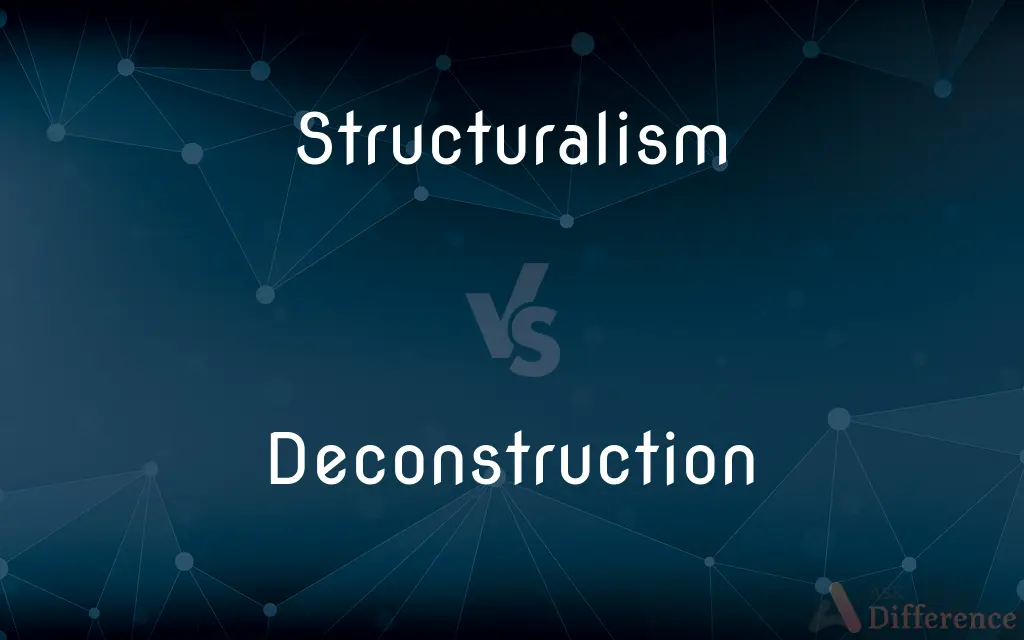Structuralism vs. Deconstruction — What's the Difference?

Difference Between Structuralism and Deconstruction
ADVERTISEMENT
Compare with Definitions
Structuralism
In sociology, anthropology, archaeology, history, philosophy and linguistics, structuralism is a general theory of culture and methodology that implies that elements of human culture must be understood by way of their relationship to a broader system. It works to uncover the structures that underlie all the things that humans do, think, perceive, and feel.
Deconstruction
Deconstruction is an approach to understanding the relationship between text and meaning. It was originated by the philosopher Jacques Derrida (1930–2004), who defined the term variously throughout his career.
Structuralism
A method of analyzing phenomena, as in anthropology, linguistics, psychology, or literature, chiefly characterized by contrasting the elemental components of the phenomena in a system of binary opposition and examining how the elemental components are combined to make larger units.
Deconstruction
A method of critical analysis of philosophical and literary language which emphasizes the internal workings of language and conceptual systems, the relational quality of meaning, and the assumptions implicit in forms of expression.
Structuralism
A theory of sociology that views elements of society as part of a cohesive, self-supporting structure.
ADVERTISEMENT
Deconstruction
A philosophical movement and theory of literary criticism that questions traditional assumptions about certainty, identity, and truth; asserts that words can only refer to other words; and attempts to demonstrate how statements about any text subvert their own meanings.
Structuralism
(biology) A school of biological thought that deals with the law-like behaviour of the structure of organisms and how it can change, emphasising that organisms are wholes, and therefore that change in one part must necessarily take into account the inter-connected nature of the entire organism.
Deconstruction
A philosophical theory of textual criticism; a form of critical analysis that emphasizes inquiry into the variable projection of the meaning and message of critical works, the meaning in relation to the reader and the intended audience, and the assumptions implicit in the embodied forms of expression.
Structuralism
(linguistics) The theory that a human language is a self-contained structure related to other elements which make up its existence.
Deconstruction
The destroying or taking apart of an object; disassembly.
Structuralism
(psychology) A school of thought that focuses on exploring the individual elements of consciousness, how they are organized into more complex experiences, and how these mental phenomena correlate with physical events.
Deconstruction
A philosophical theory of criticism (usually of literature or film) that seeks to expose deep-seated contradictions in a work by delving below its surface meaning. This method questions the ability of language to represent a fixed reality, and proposes that a text has no stable meaning because words only refer to other words, that metaphysical or ethnocentric assumptions about the meaning of words must be questioned, and words may be redefined in new contexts and new, equally valid and even contradictory meanings may be found. Such new interpretations may be based on the philosophical, political, or social implications of the words of a text, rather than solely on attempts to determine the author's intentions.
Structuralism
(mathematics) In the philosophy of mathematics, a theory that holds that mathematical theories describe structures, and that mathematical objects are exhaustively defined by their place in such structures.
Deconstruction
The process of criticising or interpreting a text by the method of deconstruction{1}.
Structuralism
Linguistics defined as the analysis of formal structures in a text or discourse
Deconstruction
A philosophical theory of criticism (usually of literature or film) that seeks to expose deep-seated contradictions in a work by delving below its surface meaning
Structuralism
An anthropological theory that there are unobservable social structures that generate observable social phenomena
Structuralism
A sociological theory based on the premise that society comes before individuals
Share Your Discovery

Previous Comparison
Glamour vs. Vitality
Next Comparison
Flamingo vs. Heron













































